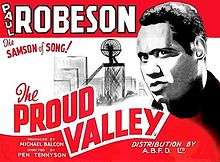The Proud Valley
| The Proud Valley | |
|---|---|
 Original UK quad format film poster | |
| Directed by | Pen Tennyson |
| Produced by | Michael Balcon |
| Written by |
Fredda Brilliant Louis Golding Herbert Marshall |
| Starring |
Paul Robeson Edward Chapman Simon Lack Rachel Thomas |
| Edited by | Ray Pitt |
Production company | |
| Distributed by | ABFD (UK) |
Release dates |
|
Running time | 76 minutes |
| Country | United Kingdom |
| Language | English |
The Proud Valley is a 1940 Ealing Studios film starring the African-American actor Paul Robeson. Filmed on location in the South Wales coalfield, the heart of the main coal mining region of Wales, the film tells the story of a Black American miner and singer who gets a job in a mine and joins a male voice choir. It documents the hard realities of Welsh coal miners’ lives.
Synopsis
David Goliath, a Black American, arrives in Wales and wins the respect of the very musically oriented Welsh people through his singing. He shares the hardships of their lives, and becomes a working-class hero as he helps to better their working conditions and ultimately, during a mining accident, sacrifices his life to save fellow miners.
Cast
- Paul Robeson as David Goliath
- Edward Chapman as Dick Parry
- Simon Lack as Emlyn Parry
- Rachel Thomas as Mrs Parry
- Dilys Thomas as Dilys
- Edward Rigby as Bert
- Janet Johnson as Gwen Owen
- Charles Williams as Evans
- Jack Jones as Thomas
- Dilys Davies as Mrs Owen
- Clifford Evans as Seth Jones
- Allan Jeayes as Mr Trevor
- George Merritt as Mr. Lewis
- Edward Lexy as Commissionaire
- Noel Howlett as Company clerk
- Ben Williams as Will Morgan (uncredited)
Production
From a treatment entitled David Goliath by the married writing team of Herbert Marshall and Fredda Brilliant, friends of Robeson in Highgate and Moscow, The Proud Valley's script was written by Louis Golding with the help of the novelist Jack Jones.[1]
Robeson's role was based on the real-life adventures of a Black miner from West Virginia who drifted to Wales by way of England, searching for work.[2] After two years of refusing offers from major studios, Robeson agreed to appear in this independent production, seeing (he told The Glasgow Sentinel) an opportunity to "depict the Negro as he really is—not the caricature he is always represented to be on the screen."[3]
Filming was completed in September 1939 but producer Michael Balcon and director Pen Tennyson were forced to recut the ending of the film in the new atmosphere following the outbreak of war. An ending in which the workers took control of the mine was replaced with a scene in which management agreed concessions to the miners.[4]
Critical reception
Robeson's criticism of British and French appeasement and strident pro-Soviet statements (immediately after the signing of the Nazi-Soviet Pact) led to him (and by extension the film) being placed on a publicity blacklist by Lord Beaverbrook, proprietor of the Daily Express.[5] However, the Monthly Film Bulletin described the film as a "moving and enthrallingly interesting story of courage, endurance and self-sacrifice" praising it as "an outstanding achievement for all concerned" and singling out Pen Tennyson's "sensitive and skilful" direction and Robeson's "impressive presence" and "glorious voice".[6]
Variety disparaged the film as possessing "not much dramatic wealth" and compared it unfavourably with Carol Reed's The Stars Look Down. The reviewer also complained that Robeson "delivers only two songs and neither solo".[7]
The film critic Matthew Sweet declared in 2005 that if the film had been completed before the outbreak of war "it would have been the most uncompromisingly Marxist picture ever produced in Anglophone cinema".[8]
Significance
In The Proud Valley, Robeson depicts a kind of Black hero rarely seen in Hollywood, one who fuses his political and artistic sensibilities in the image of a Black working man who achieves kinship across boundaries of race and nationality. Years later, Robeson would remark that, of all his films, this was his favorite because it showed workers in a positive light.
The Proud Valley was the first film premiered on radio. An hour long edit of the film was broadcast on the BBC Home Service a week and a half before its London release.[9]
See also
References
- ↑ Boyle, Sheila Tully; Bunie, Andrew (2005). Paul Robeson: the years of promise and achievement. Amherst and Boston: University of Massachusetts Press. p. 412.
- ↑ Seton, Marie (1958). Paul Robeson. London: Dennis Dobson. p. 120.
- ↑ Foner, Philip S (1978). Paul Robeson Speaks. New York: Brunner-Mazel. p. 553.
- ↑ Sweet, Matthew (2005). Shepperton Babylon. Faber and Faber. p. 172.
- ↑ Duberman, Martin Bauml (1989). Paul Robeson. London: The Bodley Head. p. 233.
- ↑ "The Monthly Film Bulletin". Screenonline. BFI. Retrieved 26 January 2015.
- ↑ Jolo (31 January 1940). Variety Film Reviews 1938-42 (Bowker ed.).
- ↑ Sweet, Matthew (2005). Shepperton Babylon. Faber and Faber. p. 172.
- ↑ Bourne, Stephen. "Proud Valley, The (1940)". Screenonline. BFI. Retrieved 26 January 2015.